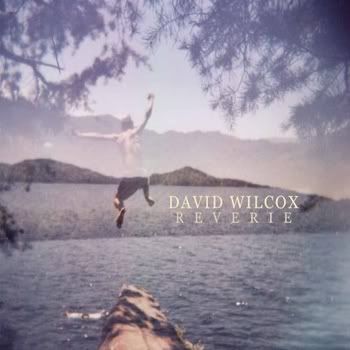
[purchase]
I’ve heard songs by David Wilcox over the years, and I reviewed his last album, Open Hand. But the new album, Reverie, marks the first time I have heard him in mostly a solo setting. There is percussion on One Way to Find Out, and the title track has, I believe, three other musicians on it, but the rest is just Wilcox and his guitar. Over the course of fourteen songs, that could have been a long album. So the great revelation for me here is just how good a guitar player Wilcox is. He displays a great versatility here in terms of the styles and techniques he brings to his playing. No two songs sound the same, and yet there is never any doubt of whose songs they are. The other treat here musically is that Wilcox’ voice sounds great. In my review of Open Hand, I praised Wilcox’ singing, and I saw no reason to mention that it sounded different than it had on the older albums of his that I have. On Reverie, he sounds more like the younger Wilcox. The subtlety that I admired last time is still here, but, on Reverie, Wilcox’ voice sounds stronger, and he sounds like he can sing exactly what he wants to here.
Lyrically, Reverie is something of an emotional tug-of-war. End of the World (Again) opens the album, and it gives no indication of what is to come; this is a drolly humorous look at doomsday prophecies, (another one?). Next comes Shark Man. Here, Wilcox’ narrator becomes menacing as a relationship sours. Having once stood by a female friend as she worked her way out of an abusive relationship, I find this song hard to listen to.
Then comes Cast Off, and the themes of the album come into focus. The song starts with a person literally having a cast removed from a broken arm that is not fully healed. The patient has become so used to the cast that he or she no longer has the confidence to do without it. The cast becomes a metaphor for becoming dependent on a state of weakness, and the situation is described beautifully. Then, something surprising happens; at the very end of the song, the plaster of the cast becomes the plaster of a church ceiling. What had been a song about a relationship turns into a meditation on the dependence on organized religion. The amazing thing is, you don’t feel like Wilcox has misled you; the thematic shift makes sense, and the song works as a coherent whole. This is one of the most remarkable pieces of songwriting I have ever heard. From then on, Reverie alternates between relationship or personal songs and songs about the world at large. Issues include the religious right, strife in the world between faiths, and the hypocrisy of “patriots”. These worldly songs never get strident; however, Little Fish and We Call It Freedom are gently tongue-in-cheek, and I could see how a listener might miss the satire, and think that Wilcox actually means the words he sings. The more personal songs include the two cowrites on the album. Angeline, the beautiful love song that closes the album was written with Gary Jules. David Wilcox and Billy Jonas perfectly describe the point in a relationship where you decide to dare to fall in love in One Way to Find Out. Wilcox talks about how he feels connected to the tradition of music in Ireland; from the sound of it, if he and I were in Ireland at the same time, me might meet each other while looking for music and musicians.
David Wilcox recorded Reverie in front of a live audience, who were instructed not to applaud until they were sure that each song was over. He says in the liner notes that he was looking for the energy that a live audience gives him. I would say that he found it. Wilcox brought that audience a fine set of songs, which they got to hear before anyone else. I would call that a fair trade.
David Wilcox: Cast Off
David Wilcox: Ireland






0 comments:
Post a Comment